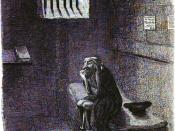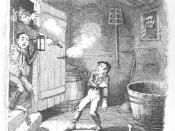Dickens' and Bronte's Definition of Class
People of the lower classes in Charles Dickens' Oliver Twist and Charlotte Bronte's Jane Eyre have no way of achieving higher status unless they come across a miracle, such as receiving a previously unknown inheritance. This is shown in both the novels of Jane Eyre and Oliver Twist. Both of the main characters grow up in similar situations; they are both orphans and because of that fact they are treated like they were criminals from birth. Although Jane is better off than Oliver in the places that she lives, they both go through some of the same emotions throughout the novels. Both Dickens and Bronte lived in the same time period and their novels were published within ten years of each other. In their novels they show the England they perceived as one that is overly obsessed with class. Neither of the authors agreed with this obsession and criticized it in their own ways.
Dickens showed this by using sarcastic remarks when describing the rich, and (as well as Bronte) characterized almost all of the upper class as being immoral in one way or another. They put the point across that just because a person is born poor doesn't make them any less intelligent, polite, or morally inapt.
In the novel of Oliver Twist, Dickens describes that poor people are just as intelligent and good as the rich, it's the way the rich treat them that forces the poor to steal. Through out the novel he sets examples of how intelligent and good Oliver Twist is treated like an animal just because he is an orphan. One of many examples of this is Mrs. Sowerberry's reaction when her husband gets Oliver to come over to help with the undertaking business and to...


